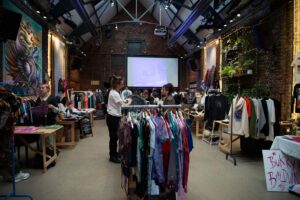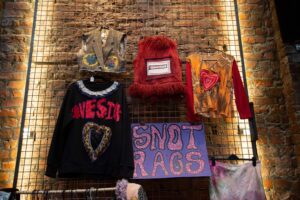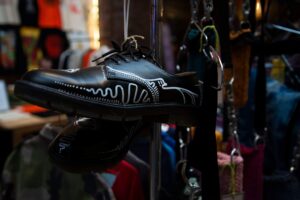“Regrowing Manchester’s Cottonopolis in the right way.” – interview with ‘Future Fashion Fair’
December 9, 2021

Future Fashion Fair #2, Winter 2021
Fast fashion is one of the great challenges of today’s global market system. Big High Street names like, Zara and Primark, contribute to the constant production of countless clothing items in order to keep up with the rapid change of styles in fashion. This fuels excessive consumption by Western customers and is an immense and indicative crisis of the world economy.
Controversies abound fast fashion, from the workforces in developing nations it exploits, to the damage it causes the environment and the independent businesses it undercuts. Yet the role it has played in making fashionable clothes affordable for people means these brands are propped up by consistent, growing consumer demand.
Breaking down the problems with fast fashion and trying to address them is a huge task for today’s world. And the team behind Future Fashion Fair (FFF) are not shying away from it.
The FFF are determined to promote sustainability and teach more people about the consequences of fast fashion. Two fairs have been arranged in Manchester, with local sustainable clothes brands invited to sell their clothes, whilst talks and sessions on the economics of fast fashion take place in tandem.
TSOTA caught up with Joe Mountain, one of the FFF’s organisers, to find out more about the fair and what their future really holds…

Future Fashion Fair #2, Winter 2021
“We buy too many things,” says Joe. “The fair is pushing ideas of sustainable fashion, but from a business to consumer angle rather than business to business… no one is really speaking to the consumer.”
Joe studied fashion at Manchester Metropolitan University and is currently mastering at the University of Leeds. His team mates are also fashion course students, which gives them the connections and the knowledge to organise the FFF. But it is their experience of contemporary fashion that inspired them to start it in the first place.
Joe went to India for 5 months as part of a university placement, learning about the material end of the production line.
“I started to see the scale at which things were being produced, but there was no one trying to create sustainable alternatives to the materials.”
India is one of the many countries that Western brands outsource their production to in order to get around pollution and workers rights regulations. Factories produce tonnes of garments with underpaid labour, which make their way to the big stores in the UK to be sold to consumers unaware of their journey. Few people get to see the supply chain in action, but understanding where these clothes come from is essential for fast fashion to improve.
The FFF started in the summer of 2021 and have partnered with The Yard in Manchester’s Green Quarter to host two fairs. Though they are engaging in a global issue, it is in Manchester that they see the most potential for impact.
“We want to regrow Manchester’s Cottonopolis in the right way – through innovation and sustainability. Manchester needs to have it’s fashion identity back.”
For their most recent event on 27th November, FFF invited local sustainable clothes brands to participate to give them more exposure to customers and each other. The FFF attendees learn about the sustainable fashion alternatives in their city and can leave having supported them through purchasing items. But it is the educational side of FFF that Joe insists is most important.

Future Fashion Fair #2, Winter 2021
“People may come to the fair and buy some vintage clothes, but we need them to take the ideas back with them,” says Joe. “We want to avoid the rebound effect, where people fall into old consumer habits.”
The growing audience for the FFF, predominantly other fashion students, poses an interesting challenge for the team. Joe explains that FFF “…have people coming who really care about fashion and sustainability; then you have people who are interested in sustainability generally but don’t really know about how it relates to fashion; then you have about 70% of the population who you want to target but are difficult to reach.”
The affordability of fast fashion means that, like many other ‘green’ products, having an alternative option is seen as a middle-class luxury. But Joe believes education, not just around sustainable fashion brands but of overconsumption, is a bigger factor than cost in changing consumer attitudes into behaviours.

Future Fashion Fair #2, Winter 2021
“Surveys suggest they don’t care, but I don’t think it’s that… I think it’s because they’re not aware.” Although Joe accepts that “fast fashion brands provide an option to those on a lower income, who want to afford clothes” his hope is that if the FFF “can tap into people who can afford clothes, yet don’t need to buy so many and don’t need to buy from these brands, then we can expand our audience.”
Despite their youth as a project, the FFF have every intention to expand: “We could grow to different cities, or to different countries – we’ll expand the fair at The Yard in the summer when the weather is on our side, get loads of vendors and get more people to come…”
Wherever they spread to, maintaining the sense of community they’ve established is going to be essential: “As we grow we want to localise what we do – if we move to Sheffield we’ll engage the brands in Sheffield.”
Joe accepts taking on fast fashion “is a challenge and it’s not going to happen overnight,” but their localised approach will give them the best chance of engaging and educating their target audience, ultimately challenging the high street where they’re based.
Exploring the rest of the North and eventually the UK, is an ambitious strategy for the FFF, but not unrealistic given their drive and what they’ve achieved already. Fast fashion might be massive, but so are the numbers of people considering what they buy and do in favour of eco-friendly or ethical approaches. Making the link between the two, in Manchester and beyond, is where the Future Fashion Fair will succeed.
We can’t wait to see what the Future Fashion Fair do next. To keep updated with them, follow them here on their instagram.
Filed under: Fashion
Tagged with: brands, business, climate crisis, clothes, consumer demand, consumers, fair, fashion, fashion fair, fast fashion, greenwashing, interview, sustainability, unsustainable



Comments